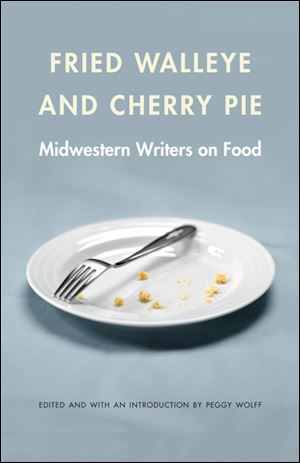
FOOD & NUTRITION
Midwestern memories
‘Fried Walleye and Cherry Pie’ skips sugary sentiment for matter-of-fact portraits
11/11/2013
Fried Walleye and Cherry Pie: Midwestern Writers on Food
Is there a Midwestern cuisine?
As an outsider — as a non-native to the Midwest who has lived in the Midwest for years, and who is still surprised that red barns are not just for children’s books, and whose Yankee grandfather referred to everything west of Pennsylvania as “the expansion teams” — I am innately dubious of this claim.
See, I just finished picking my way through Chicago food writer Peggy Wolff’s thoughtful, addicting, occasionally spotty new anthology, Fried Walleye and Cherry Pie: Midwestern Writers on Food, and despite the regional specialties and the regional traditions, the book’s core argument — that the Midwest (“where the whole food industry began!”) is culinarily distinctive, wondrous, and unappreciated — is a tough sell. The Midwest may claim to be the cradle of civilization, but everyone, everywhere, sees pork, cheese, and pie as their birthright.
When I contacted Wolff recently and explained this, she defended herself with spirit: “The Midwest is the home of fast food chains that populate the country! And the Midwest is full of orchards and fields of grains! And when you eat cereal, you are eating those fields! Also, I just think that the Midwest gets a bad rap, because, foodwise at least, we have everything either coast can claim. And though you might argue the Midwest is about big pots of roast surrounded by vegetables — because Midwesterners need their meat — it’s more diverse. Truth is, though, when I asked (writers) to contribute, no one wanted to write about foam.”
Which was wise.
Wolff had the good sense to approach not necessarily just good food writers, but good writers; Elizabeth Berg, Jacquelyn Mitchard, and Bonnie Jo Campbell alone could flesh out any smart bookstore’s Midwestern literary fiction section. Even better, her contributors’ thoughts fall not on modernist wonders or a perfectly described bratwurst, but on memories, sweet, bitter, and odd.
“Diabetes finally triumphed in 1952, mere days before the doctor was scheduled to amputate Grandpa Henry’s second leg,” begins Mary Kay Shanley’s recollection of an Iowa Thanksgiving, a story that concludes with her daughter, a generation later, bringing home “a California boy who doesn’t own a single drop of Caucasian blood.”
Tradition and change: These are the poles of Fried Walleye and Cherry Pie, which works best as a consideration of regional temperament.
Just don’t confuse that with honey-glazed memories: Molly O’Neill, former New York Times food writer, describes growing up in Columbus as growing up in “the middle of a conversation between two Americas,” her Dust-Bowl dad on one end and her fancier mother on the other. The great Stuart Dybek remembers touring the Armour packing plant in Chicago, receiving “a cold hot dog wrapped in a napkin” as a souvenir, riding back to school with the nuns, “eating our hot dogs, singing ‘Frere Jacques.’”
The overlooked short-story writer Thom Jones, an Aurora, Ill., native, recalls memories of another Midwestern ritual, the assembly line. He writes about working at General Mills and the managerial alarm that sweeps the factory floor when it’s rumored that a customer found a note stuffed into a box of Betty Crocker Noodles Almondine, presumably written by someone in their midst.
The note: “HELP! SLAVE CHAINED TO THE CORNFLAKES LINE. CALL THE NATIONAL GUARD.”
I’m not sure Wolff ever intended to veer from misty-eyed recollections into the Coen brother’s Midwest, but, again and again, in bits and pieces, then entire entries, it’s what she got. Of course, there are also the considerations of state fairs and sweet corn, alongside recipes for buttermilk doughnuts and cakes. But the real heart of Fried Walleye and Cherry Pie is twisted and engorged, and also like the Midwest, matter-of-fact. O’Neill writes: “My mother thought food wrapped in plastic was for other people. My father thought it was a Communist plot.”
Who said the Midwest doesn’t have enough diversity?